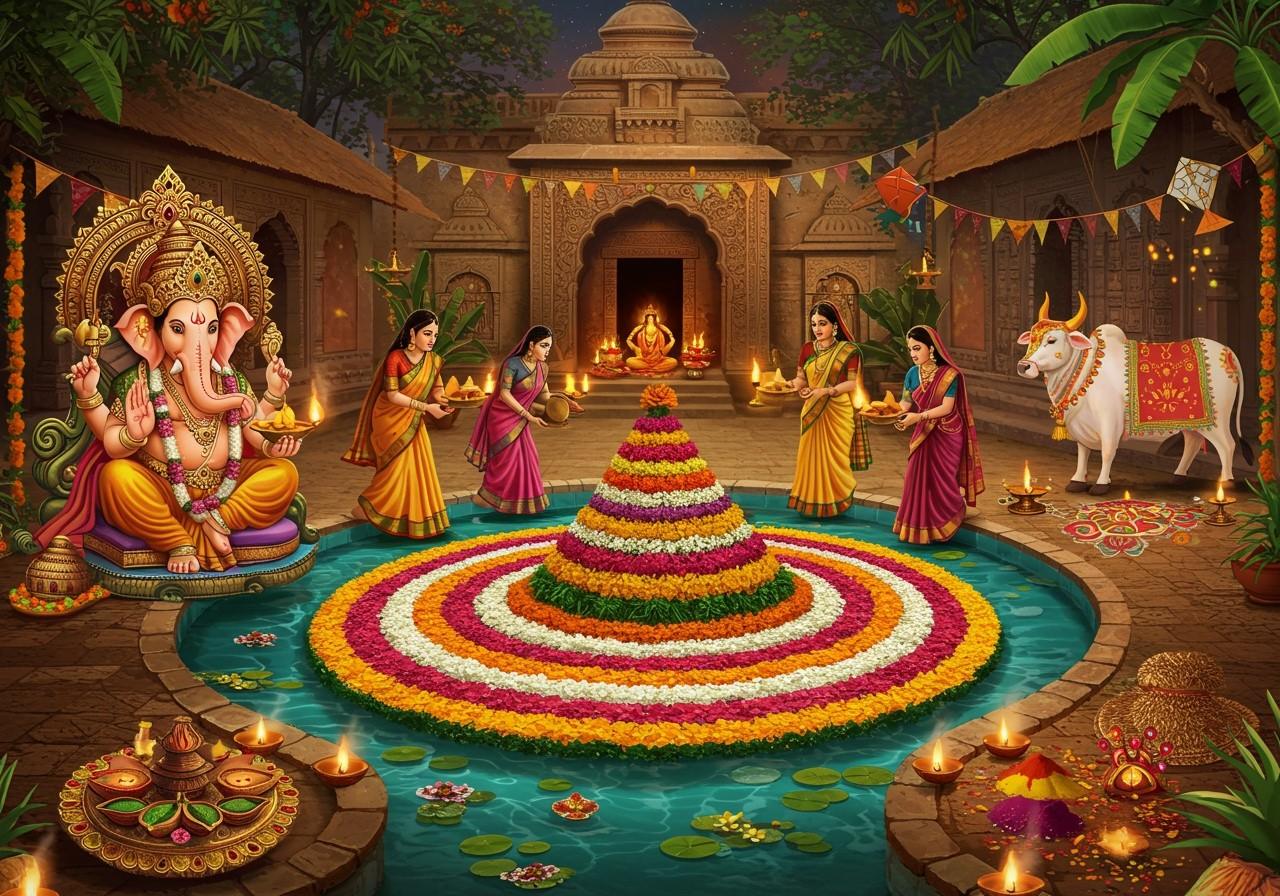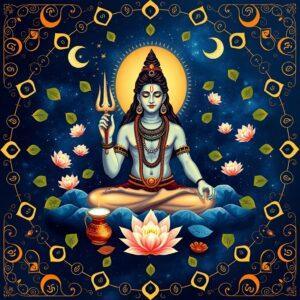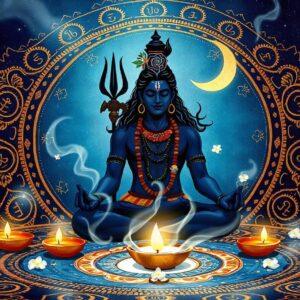
Telugu festivals form a vibrant tapestry of Telugu culture, celebrated with immense enthusiasm across Andhra Pradesh and Telangana. These festivals are not merely occasions for joy and merriment; they are a reflection of the community’s values, traditions, and rich heritage. Each festival boasts unique rituals, customs, and historical significance, offering a glimpse into the heart of Telugu life.
Ugadi: The Telugu New Year
Ugadi heralds the arrival of the Telugu New Year, steeped in historical and mythological significance. A key element of Ugadi is the Ugadi Pachadi, a unique dish blending six different flavors, symbolizing the diverse experiences of life – sweet, sour, salty, spicy, bitter, and astringent. This reminds us that life is a mix of all experiences. The preparation and consumption of this dish is a symbolic act of welcoming the new year with all its potential joys and challenges.
Ugadi traditions include:
- Cleaning homes: This symbolizes a fresh start and the removal of any negativity from the past year. Homes are thoroughly cleaned and purified in preparation for the new year.
- Decorating with mango leaves: Mango leaves, considered auspicious, adorn doorways and entrances, signifying prosperity and good fortune for the coming year. The vibrant green leaves also symbolize new beginnings and growth.
- Offering prayers: Prayers and offerings are made to deities, seeking blessings for a prosperous and happy new year. Special pujas are performed in homes and temples.
Cultural performances, music, and dance add to the festive fervor. The Panchanga Shravanam, the reading of the new year’s almanac, holds great importance, providing guidance and predictions for the year ahead, much like consulting a horoscope.
Sankranti: A Celebration of Harvest
Sankranti, known as Pongal in Tamil Nadu, marks the end of the winter solstice and the beginning of the harvest season. It is a time of thanksgiving for a bountiful harvest and a celebration of the sun’s northward journey (Uttarayanam). The festival spans three days, each with its own distinct significance.
Sankranti celebrations include:
- Bhogi: On the first day, Bhogi, bonfires are lit, signifying the burning away of old belongings and negativity, making way for new beginnings. It is a time of cleansing and renewal.
- Makara Sankranti: The main day of the festival is Makara Sankranti, when the sun enters the zodiac sign of Capricorn (Makara). This day is marked by prayers, offerings, and festive meals.
- Kanuma: The third day, Kanuma, is dedicated to the worship of cattle and agricultural animals. They are decorated, fed special treats, and thanked for their contribution to the harvest.
Customs like kite flying, rangoli making, and preparing traditional dishes like Ariselu and Pongal add to the festive cheer. Sankranti fosters community bonding through gatherings and cultural events.
Deepavali: The Festival of Lights
Deepavali, or Diwali, symbolizes the triumph of good over evil. The festival commemorates the return of Lord Rama to Ayodhya after 14 years of exile, as well as the victory of Goddess Durga over the demon Mahishasura. It is a time of light, joy, and celebration.
Deepavali traditions include:
- Lighting oil lamps: Homes are illuminated with diyas (oil lamps), symbolizing the dispelling of darkness and ignorance. The flickering lamps create a warm and inviting atmosphere.
- Bursting fireworks: Fireworks light up the night sky, adding to the festive spirit and symbolizing the victory of light over darkness. However, it is important to celebrate responsibly and consider the environmental impact.
- Decorating homes with rangoli and flowers: Intricate rangoli designs and colorful flowers adorn homes, adding to the festive ambiance and welcoming Goddess Lakshmi, the goddess of wealth and prosperity.
Special dishes like Laddu and Kaju Katli are prepared and shared with family and friends. Lakshmi Puja is performed to invoke blessings for prosperity and abundance.
Dasara: Celebrating the Victory of Good Over Evil
Dasara commemorates Lord Rama’s victory over Ravana, symbolizing the triumph of good over evil. This ten-day festival culminates in Vijayadashami, marking the end of the nine-day Navratri festival. It is a time of celebration, devotion, and cultural events.
Dasara observances include:
- Durga Puja: During the first nine days of Navratri, Goddess Durga is worshipped in her various forms, symbolizing strength, power, and victory over evil.
- Ayudha Puja: On the ninth day, Ayudha Puja, tools and instruments of trade are worshipped, expressing gratitude for the means of livelihood.
- Vijaya Dashami: The tenth day, Vijaya Dashami, marks the culmination of the festival. It is believed to be an auspicious day for new beginnings and ventures.
Special dishes like Pulihora and Payasam are prepared. Family gatherings and community events enhance the festive atmosphere.
Varalakshmi Vratam: A Tribute to Goddess Lakshmi
Varalakshmi Vratam is a festival dedicated to Goddess Lakshmi, the goddess of wealth and prosperity. Married women observe this vratam (fast) seeking blessings for the well-being of their families. It is a day of devotion, prayer, and ritualistic observances.
Varalakshmi Vratam practices include:
- Fasting: Women observe a fast, abstaining from food and dedicating themselves to prayer and devotion.
- Offering prayers: Special prayers and mantras are recited, invoking Goddess Lakshmi’s blessings for prosperity and happiness.
- Decorating the idol: An idol of Goddess Lakshmi is beautifully decorated with flowers, jewelry, and new clothes.
Dishes like Pongal and Payasam are prepared as offerings. The festival is a testament to the deep faith and devotion of Telugu women.
How Poojn.in Enhances Your Telugu Festival Celebrations
At poojn.in, we understand the importance of having the right puja samagri for your Telugu festival celebrations. We offer a comprehensive range of products to meet all your needs. Whether you’re looking for specific items for Ugadi, Sankranti, Deepavali, Dasara, or Varalakshmi Vratam, you’ll find everything you need on our platform. Shop now for high-quality dhoop and deep items.
For festivals dedicated to Lord Shiva, such as Maha Shivaratri, we offer a wide selection of items, including:
- Pure copper kalash sets for abhishekam: Perform the sacred abhishekam ritual with our authentic copper kalash sets.
- Traditional bilva leaves and garlands: Offer fresh bilva leaves and garlands to Lord Shiva.
- High-quality dhoop and deep items: Create a sacred atmosphere with our premium dhoop and deep items.
- Authentic rudraksha malas: Enhance your spiritual practice with our genuine rudraksha malas.
- Pure silver items for worship: Offer pure silver items to Lord Shiva for added blessings.
We also cater to other important festivals like Shravan Maas and Vasanta Navaratri, providing:
- Complete puja samagri kits: Simplify your puja preparations with our all-inclusive kits.
- Brass and copper puja items: Choose from a variety of brass and copper items for your puja needs.
- Pure cotton wicks for deepam: Light your lamps with our pure cotton wicks.
- Premium quality camphor: Enhance the aroma of your puja with our high-quality camphor.
- Traditional Telugu puja books: Follow the traditional rituals with our authentic puja books.
Poojn.in offers:
- Quality certification: We ensure all our products are of the highest quality and meet stringent standards.
- Pan-India delivery: We deliver our products across India, ensuring convenient access to puja samagri.
- Secure packaging: Your orders are carefully packaged to ensure they reach you in perfect condition.
- Expert guidance on product selection: Our team is available to assist you in choosing the right products for your needs.
- Authentic sourcing from trusted vendors: We source our products from trusted vendors, guaranteeing authenticity and quality.
Visit www.poojn.in or contact our customer service for festival-specific puja items. We are committed to providing genuine, ritual-appropriate items delivered right to your doorstep, blending the sanctity of your celebrations with the convenience of modern shopping.
Conclusion
Telugu festivals are integral to the cultural tapestry of Andhra Pradesh and Telangana, embodying the community’s cherished traditions and values. These celebrations foster joy, unity, and a deep connection to heritage. From the vibrant hues of Ugadi to the bountiful harvest of Sankranti, the radiant lights of Deepavali, the victorious spirit of Dasara, and the devoted prayers of Varalakshmi Vratam, each festival possesses a unique charm and significance.
Embrace the beauty and spirituality of these Telugu festivals, experiencing the warmth and togetherness they bring to families and communities. With the ease of online shopping, preparing for these celebrations is now effortless, ensuring you have all the authentic ritual items you need. Celebrate with love, respect, and enthusiasm, keeping the Telugu heritage shining brightly for generations to come.
FAQs: Telugu Festivals and Celebrations
When is Ugadi celebrated? Ugadi, the Telugu New Year, falls in March or April, with the exact date varying each year according to the lunar calendar. For example, in 2025, Ugadi was celebrated on March 21st.
Which is the most significant festival for Telugu people? Sankranti, also known as Pongal, holds the distinction of being the most important festival for the Telugu community. Celebrated in January, it coincides with the harvest season and is a time of great rejoicing and thanksgiving.
Which Telugu festival is being celebrated today? To determine which Telugu festival is being celebrated today, refer to a Telugu calendar online or consult local news and community resources. These sources provide up-to-date information on festival dates and timings.
Why is Ugadi significant for Telugu people? Ugadi marks the commencement of the New Year, symbolizing new beginnings and renewal. It is observed with special foods, decorations, and rituals, signifying a fresh start and hope for the future.
How do Telugu people observe Sankranti? Sankranti celebrations are vibrant and diverse, featuring activities such as kite flying, preparation of traditional dishes, home decoration with rangoli, and offering prayers. It is a time for community bonding and festive cheer.
What are the key rituals of Ugadi? Ugadi rituals involve cleaning and decorating homes, preparing special foods like pulihora and bobbatlu, and listening to the Panchanga Sravanam (almanac reading). These practices symbolize purification, prosperity, and guidance for the new year.
What is the significance of Pongal during Sankranti? Pongal, a dish made from newly harvested rice, jaggery, and milk, represents gratitude to the sun god for a bountiful harvest. It is a central element of Sankranti celebrations, symbolizing abundance and prosperity.
Do Telugu people celebrate Diwali? Yes, Diwali is celebrated by Telugu people, just as it is by many other communities across India. The festival involves lighting lamps, bursting fireworks, and performing Lakshmi puja, seeking blessings for wealth and prosperity.


